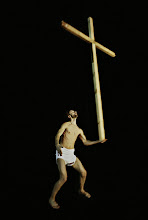
Image: SPILL Festival presents Pacitti Company in 'Civil'
Robert Pacitti is the Artistic Director of Pacitti Company, and the Festival Director of SPILL. He’s been making work for twenty years, and has won over twenty awards; he’s been supported by LADA, was the first recipient of a Time/ Space Fellowship from King Alfred University College, Winchester, and is a co-founder of the New Work Network. No stranger to success, then. Neither, you’d have to assume, is he someone with a lot of time on his hands.
So what made him produce the SPILL Festival? And, given the fact that there are three shows by Pacitti Company in the Festival, how does the event affect his position as a maker of work?
Robert Pacitti doesn’t hide the fact that SPILL is a platform for his work. There is nothing like it in
But the three venues participating in SPILL, Pacitti hopes, will go some way to redressing this specialisation. He hopes that audiences will go to more than one venue, and points out that audience development works both ways: the venues hope to attract more and diverse audiences through SPILL as much as SPILL hopes to through the venues. On the day after Raimund Hoghe’s performance at the Barbican, Pacitti was pleased to note the ‘older, monied’ audience. Naturally, he’d like to court these types of people (although such a fast-selling show begs the question – were these really new audiences, or Hoghe aficionados?), but while it’s easy to imagine Shunt regulars going to the Barbican or Soho Theatre, it’s not so easy to imagine some types of Barbican regular enjoying an evening at Shunt.
And yet the difference in venues is not just about bringing in visitors. Each location, Pacitti says, will bring its own angle to the work shown. The ‘edginess’ of some work might have a particular thrill at the Barbican; the formal innovation of other pieces could present a new direction at Soho Theatre; and while you might expect to see challenging work at Shunt, Pacitti hopes the parity with the other, more established venues will lend the work and its situation a kind of credence.

Robert Pacitti is drawn towards a ‘dirty word’ in Performance Art circles: ‘Community Art’. SPILL is about working with people, art that involves conversations and the working through of conflicts. It’s a principle that also runs through Pacitti Company’s ‘Finale’ pieces, performances the company creates with local artists when they perform overseas. Many of the artists programmed into SPILL have come through this process with Pacitti Company – a curatorial premise that also means there is a real international flavour to the event. And there will be a ‘Grand Finale’ to close the festival, created along the same lines.
Nevertheless, SPILL remains Robert Pacitti’s initiative. As in the ‘Finale’ shows, he is the artistic director, he has the final say. He’s chosen artists who are ‘socially engaged’, and interested in ‘the politics of representation’. The Sunday and Monday SPILLs, for example (showcases of a variety of work, from 5pm to 11pm over the Easter weekend), have an emphasis on work relating to the body: Eve Bonneau, Andrew Masseno, Hancock and Kelly. But this interpretation can also be subjective – Raimund Hoghe does not describe his work as about disability, although the use of his own body often invites the description.
And SPILL does not just feature artists who have an obvious thematic or working relationship with Pacitti himself. Given the circumstances, he argues, how could he not invite a company like Forced Entertainment to perform? ‘I had a wish list of maybe ten artists’, Pacitti says, ‘which was only capped by money.’
So does this mean that Pacitti, and his theatre company, are becoming mainstream? Are they positioning themselves at the centre of a new visibility for performance art in this country? There are, after all, plans for at least one more SPILL Festival in 2009. Pacitti sees the relationship between ‘mainstream’ and the ‘edge’ as like that between tectonic plates - constantly shifting - and emphasises the fact that he is ‘in service’ to the other artists involved. In any case, does it matter? Those categories rarely mean anything to the people who are in them, and they are never set in stone.
It does raise the question, though, of what Robert Pacitti’s role in all this is likely to be. He’s the first to admit that, though happy to work in the service of others to produce SPILL, he is first and foremost a maker himself. After the 2009 SPILL he’ll reflect on what he wants to do – concentrate on his own company or continue behind the scenes. And, straight after the Festival is all cleared up, Pacitti Company are beginning a five week tour of
Robert Pacitti describes the process of creating the festival as ‘human’ and ‘intuitive’. Now, with the support of venues, press and the art world, it’s tempting to ask why nobody’s done it before. The fact is, they did not, so SPILL is here. And, flavoured by Robert Pacitti’s tastes as it is, it’s a welcome arrival to the city.
Mary Paterson

.jpg)
No comments:
Post a Comment